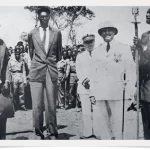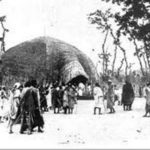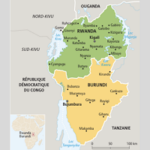The Colonial Legacy in the Postcolonial Period
Following a second exile of seventeen years, Ntambuka, Ndogosa’s son and successor, returned to Ijwi just before independence in 1960.Yet the territorial division of the island remained as it had been since Bera’s death in 1936. Ndogosa’s son retained only the southern part, and Bera’s son, Rubenga, the northern.
There was, however, more continuity between the postcolonial regime and the colonial structure than in the territorial divisions alone. The chief in the north followed a pattern similar to that of his father. He was a “modernizer” who faithfully (and rather ostentatiously) transmitted hierarchical commands; he entertained his superiors lavishly when they visited him; he encouraged his population, in various ways, to work outside the island; and he implemented generalcommands with considerable zeal. (The attempts to implement the Zairean policies of salongo, a new form of corvée labor, and of regroupement de villages during the 1970s provide examples of this.) Before the separation of Ijwi from the Zone of Kalehe (formerly the “Territoire,” the foundational administrative unit) in 1974, he was also a frequent visitor to the administrative headquarters of the Zone at Kalehe. He obeyed orders with alacrity; in December 1971, for example, when President Mobutu gave a speech in Bukavu, the provincial capital of Kivu, in which he implied that a forthcoming administrative reorganization would remove the bami from positions within the administrative hierarchy, Rubenga submitted his resignation. This he quietly withdrew several weeks later when it be-came clear that the proposed administrative reforms would be delayed. Ntambuka in the south did not even think of resigning. He was willing to accept a reduction of power (in fact, he had already ceded most administrative powers to his son). But he simply could not resign from the bwami—this was a status outside his administrative competence to change. Again, the comparison shows the willing flexibility of the northern segment of the royal family acting to protect their interest by conforming to administrative proposals from above.
Another parallel of Rubenga’s rule with that of his father was in his appointment of authorities. While capitas at the village level in general have tended to come more from the local population, Rubenga also assigned certain villages to members of the modern elite—to teachers and administrators. These men per-formed functions within the new system analogous to those formerly assumed by members of the royal family—sons and brothers (occasionally wives and sisters) of the king. In the south these functions were carried out by local residents of the area concerned or members of the king’s family, as was done historically.
Yet the social dynamics in the postcolonial period changed the focus of power for people from Ijwi. Whereas before, the Westernized elite looked to Bera as a patron and colleague, the bitterest complaints about his son Rubenga often emanated from the elite. In the south, however, where Ntambuka worked primarily through local capitas who representatives from the areas were where they lived, there was less overt conflict between the modern elite and the administration. Outlets for the elite were found off the island in their occupational, commercial, or social contexts, and with Ntambuka’s interests focused primarily on the local level of village affairs, there was little confrontation. Ntambuka in the south, like his father before him, based his authority primarily on his internal position: it was, after all, the support of his followers (in the “tax revolt”) that returned him from his first exile, and the results of a popular referendum that did so from hissecond period of exile.His long absence from Ijwi and hence removal from the political game during the 1940s and 1950s made him less adept at and less willing to engage in regional politics than his counterpart in the north. He was less zealous in carrying out the demands of authorities above him and in following the short-term fluctuations and alterations in administrative policy and innuendo. But he was also perhaps more sensitive to, if not actually involved in, the local affairs of his domain.
This pattern of differences can be traced back for several decades, to the period following death and the recall of Ntambuka from his first period of exile. The colonial summary of the political situation on Ijwi for 1939 provides an ex-ample of such differences in its assessment of the two rulers, Rubenga in the north and Ntambuka in the south.
On Ijwi the two chiefs [Rubenga, son of Bera, and Ntambuka, son of Ndogosa] rival each other in zeal. Rubenga shows a sincere desire to do well [by the administrative norms]. However, he is sometimes lazy [in his relations with the population] and still lacks experience…. Ntambuka is less eager to please before the Europeans. He finds himself in a difficult position. He has to pro-vide simultaneously for the population which he found on his return [from exile] on the southern part of the island, and those who, having formerly left the island with members of the family of the former mwami Mihigo Ndogosa, have since returned with Ntambuka and now make demands on him…. He is totally uninterested in the colonial functions demanded of him.
Thus the more aggressive style of the chief in the north led to greater demands on the population; but there was less overt opposition to the system as a whole at the village level in the north than in the south, where the tradition of resistance was encouraged by the intensity of colonial imposition and the greater sense of corporate action. The difference between the two areas in this regard was a constant feature of Ijwi politics since early colonial rule was imposed. Among the population of the south, a manifest capacity for conflict with higher administrative authorities surfaced at times in the postcolonial period. But such activity was more a question of groups acting to oppose administrative encroachment in local affairs (especially in the opposition to the abuse of tax collectors, police, or census takers) than outright rebellion to the court and its functions; in fact, the sense of continuing loyalty to the court by the population in the south included a clear concept of the limits to the court’s power and of its responsibilities to protect the population from colonial exactions. And this difference, which has historically distinguished the two regions, is explained in part by how boththe political authorities and people approached the question of political legitimacy. Ntambuka derived his power from local factors; Rubenga derived his from external sources. These two political bases made a significant difference in the types of power each chief employed and in their application of power.
The litany of imposed colonial burdens is frequently encountered in the African context. But the history of colonial rule is not simply the product of short-term political decisions of the moment. It is rather the product of the con-junction of the accumulated traditions of social and political behavior with newly imposed demands. The longer-term historical rhythms and social patterns are important because they affect, even if they do not determine, the manner of application and the nature of the impact of policy decisions. This chapter has explored the relations of such local traditions to the imposed colonial super-structure. Although society changed, often drastically, during the period of early colonial rule, such changes as occurred were often implicitly within the social structures and the character of political behavior of earlier periods. It is these internal mechanisms that colonial rule seized on and adapted—even distorted— in pursuing the goals of colonial administration.
In this case, alternative leadership was ready at the crucial moments of colonial history to step into new positions posing as traditional authorities; these leaders thus made it possible to preserve intact the mirage of indirect rule where the actual image had been shattered by the resistance of legitimate rulers to the surrender of their sovereignty. Faced with conflicting conceptions of political authority, Ndogosa and Ntambuka chose to conform to popular local notions of kingship, and their behavior then appeared uncooperative in the eyes of the Belgian administrators, who wanted the power of chiefs to be clothed with the authority of kings. Furthermore, as colonial administrative power increasingly affected the population, the people in turn responded to the changing political context in ways that were also derived from their earlier traditions of political behavior and perceptions. Not all initiative had left them; at the very least, they retained the potential of the “politics of inertia,” and often where they retained the possibility of corporate action and the recognition of legitimacy in political behavior, they preserved an ability to affect policy directly. After all, they twice brought back Ntambuka. But the essential components of power had dramatically shifted from earlier times, and such change as was possible was increasingly circumscribed within the hardening colonial matrix.
This abrupt alteration in fundamental power relations created tensions within the structures of colonial rule that were never fully resolved. The most important manifestations of this contradiction between colonial power and itsuses and local concepts of legitimacy with its limitations were products of colonial attempts to manipulate the concept of legitimacy in order to justify the imposition of purely administrative norms in government. The attempt to subordinate political issues to questions of bureaucratic effectiveness in this manner, to elevate technical efficiency above perceptions of social values, continued well into the postcolonial period, and many of the tensions that accompanied the introduction of these policies remain as an enduring legacy of colonial rule in Zaire today. For although kingship may no longer pose any political threat to the present political system, the system of values that underlay concepts of legitimacy of kingship remains largely intact. For the people of Ijwi still today, it is these norms that provide the basis for judging the legitimacy of political action.
https://uk.amateka.net/the-colonial-legacy-in-the-postcolonial-period/https://uk.amateka.net/wp-content/uploads/2023/01/king-kigeli.webphttps://uk.amateka.net/wp-content/uploads/2023/01/king-kigeli-150x150.webpSocial & cultureFollowing a second exile of seventeen years, Ntambuka, Ndogosa’s son and successor, returned to Ijwi just before independence in 1960.Yet the territorial division of the island remained as it had been since Bera’s death in 1936. Ndogosa’s son retained only the southern part, and Bera’s son, Rubenga, the northern. There...BarataBarata rpierre@ikaze.netAdministratorAMATEKA | HISTORY OF RWANDA



